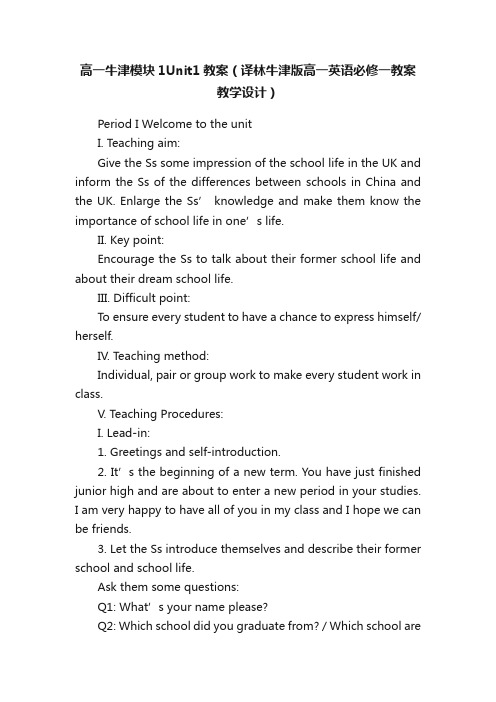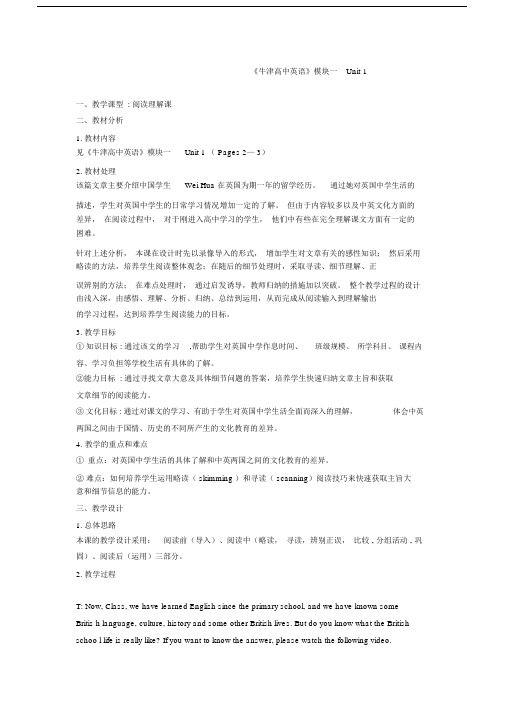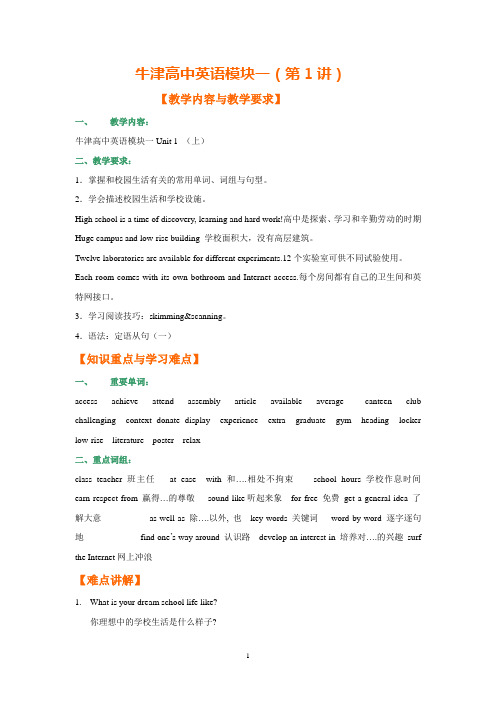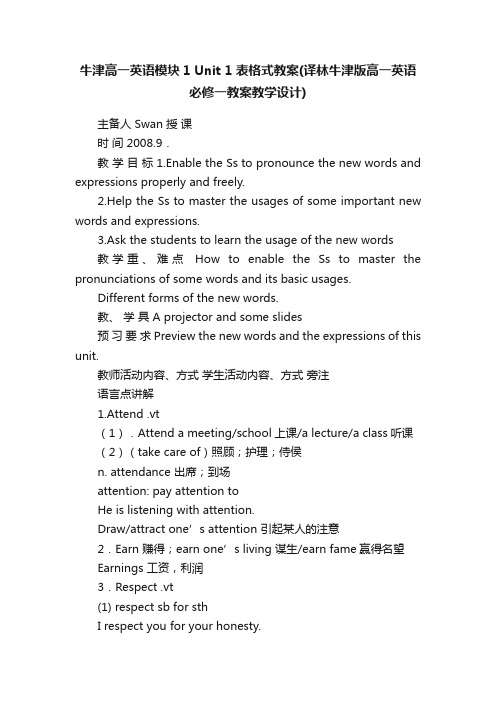高一英语教案:牛津版高一英语下册Unit1教案.
高一牛津模块1Unit1教案(译林牛津版高一英语必修一教案教学设计)

高一牛津模块1Unit1教案(译林牛津版高一英语必修一教案教学设计)Period I Welcome to the unitI. Teaching aim:Give the Ss some impression of the school life in the UK and inform the Ss of the differences between schools in China and the UK. Enlarge the Ss’ knowledge and make them know the importance of school life in one’s life.II. Key point:Encourage the Ss to talk about their former school life and about their dream school life.III. Difficult point:To ensure every student to have a chance to express himself/ herself.IV. Teaching method:Individual, pair or group work to make every student work in class.V. Teaching Procedures:I. Lead-in:1. Greetings and self-introduction.2. It’s the beginning of a new ter m. You have just finished junior high and are about to enter a new period in your studies.I am very happy to have all of you in my class and I hope we can be friends.3. Let the Ss introduce themselves and describe their former school and school life.Ask them some questions:Q1: What’s your name please?Q2: Which school did you graduate from? / Which school areyou from?Q3: Do you have any hobbies?Q4: How do you often spend your spare time?4. Introduce what studying at senior high will be like and the differences between junior high and senior high.II. Brainstorming:1. Ask the Ss to read the instructions and focus on the four pictures.Today we are going to look at schools in the UK and try and work out if they are the same or different from schools in China.2. Encourage the Ss to talk about each picture with the following diagram to help them.Pic In the UK In China1 Huge campus and low-rise buildings2 Lockers for every student3 Fewer students in each class4 At ease with our teacherIII. Further Discussion:1. Organize students into pairs or small groups.2. Discuss the three questions below the pictures in groups.3. Get small groups to report their conclusions back to the whole class.4. Conduct a feedback activity.IV. Summary and Homework:1. Today we have a good beginning: We have introduced ourselves to each other, and know about the differences between the lives of Chinese and British high school students. We also givea brief description of our dream school life.2. Find out more differences between the lives of Chinese and British high school students, say more about your dreamschool life.3. Make a plan of their studies in the coming years and a list of goals that they want to achieve in the three years.Period II ReadingSchool life in the UKI. Teaching Aims:Train the Ss’ reading abilities.Learn some useful words and expressions.Learn more about school life in the UK and the differences between school life in the UK and in China.II. Key Points:1. Help the Ss to understand the passage better.2. Learn and master some important words and phrases in this period.III. Difficult Points:1. How to help the Ss improve their reading ability and understand the passage better.2. How to master the important language points in this passage.IV. Teaching Methods:1. Fast reading to get the general idea of the text.2. Careful reading to understand the passage better.3. Discussion to help the Ss understand what they’ve learned better.4. Explanation to help the Ss master some language points.V. Teaching Procedures:I. Lead-in:1. Greetings.2. Check the homework.3. Differences between high schools in our country and theUK and opinions on many factors and reasons for such phenomena.II. Presentation:Reading strategies: skimming and scanning.Skimming: We skim a text when we want to get a general idea of what it is about. We look at the titles and headings, the first and last sentences of paragraphs and the first and last paragraphs as well as pictures and charts to guess what the text is about.Scanning: When we want to find certain information in a text quickly, we scan the text for key words and phrase, dates, numbers, etc. We do not need to read the whole text word by word.II. Skimming:1. Ask the Ss to go through the passage as quickly as possible and try to find answers to the three questions in Part A.Answers: 1. For one year. 2. Mr Heywood. 3. A small table.III. Careful reading:1. Listening while dealing with C2.Answers: C2: 1.T 2.T 3.T 4.F 5.F 6.T 7.F2. Read the article carefully and answer the questions in C1.Answers: C1: 1. School begins at around 9 a.m. and ends at about 3:30 p.m.2. 29.3. Because all the homework was in English.4. She had an extra French class.5. Lots of desserts.6. Manchester.IV. Language Points:1.(L1) Going to a British high school for one year was a veryenjoyable and exciting experience for me.① Gerund as subject:Working in these conditions is no easy job.Meeting you has been a great pleasure.* It’s no use/good sending him over. It’s too la te already.It’s a waste of time arguing about it.② exciting / excitede.g.: The children were excited at the very thought of the journey.It’s an exciting experience to swim in the sea.All the students were all excited at the exciting news.*vt. excite n. excitement adv. excitedly③ experience※ 10.(L47) I was very lucky to experience this different way of life.experience: n. & verb.[u]n. Do you have any previous experience of this type of work?My lack of practical experience was a disadvantage.* learn from experience 从经验中学得/ in one’s experience 据……的经验看[c]n. an enjoyable / unforgettable / unusual experienceIt was her first experience of living alone.verb.:e.g.: Everyone experiences these problems at some time in their lives.(经历,遭受)I experienced a moment of panic as I boarded the plane.(感受,体会)*adj.: experiencedan experienced teacher/doctorHe is experienced in looking after animals.2.(L2) I was very happy with the school hours in Britain because school starts around 9 a.m. and ends about 3 p.m.be happy with/ about : be satisfied with 对…...满意e.g. : Are you happy with this arrangement?She was happy enough with her performance.* 1. We are happy to announce the engagement of our daughter.2. The story has a happy ending.3. He will be more than happy to come with us.4. by a happy coincidence, we arrived at exactly the same time.5. That wasn’t the happiest choice of words.3.(L6) On the first day, all students went to attend assembly.* attend:△ be present at an event 出席,参加e.g.: The meeting was attended by 90% of shareholders.~ a meeting / a wedding / a funeral / assembly△ go regularly to a place 定期去,经常去e.g.: Our children attend the same school.How many people attend church every Sunday?△ pay attention to what sb. is saying or to what you’re doing 注意,专心e.g.: She hasn’t been attending during the lesson.*attend to: deal with 处理,对付 take care of 照料,关心e.g.: I have some urgent business to attend to.A particular nurse attended to him / his needs while he was in hospital.Are you being attended to , Sir? 先生,有人接待您吗?n. attendancec.f. join / join in / take part in(1) Tomorrow I will go to ________ an important meeting.(2) Would you please _______ our walking.(3) He likes _______ all kinds of outdoor activities actively.(4) Every weekend the old woman would go ________ church.4.(L9) He also told us that the best way to earn respect from the school was to work hard and achieve high grades.(1) way: 方法 way to do sth. / way of doing sth.e.g. There are a lot of ways to make money.Soon I got used to the American ways of doing things.* in a way / in one’s own way / in no way / in the way / on the way/ on one’s way/ in this waye.g.: Your answer is in a way correct.He likes to attend to his affairs in his own way.He is no help at all; actually he is in the way.In no way can you tell him the truth.Work hard! We are on the way to success.On the way to the school, I found a man lying on the road.A car was in the way. We couldn’t get through.You can do it in your own way.(2) earn: vt. ①get money for work that you do 挣得;赚得e.g.: He earns about £10 000 a year.She earned a living as a part-time secretary. (=make a living) earn money / a fortune/②get something that you deserve, usually because of sth good you have done or because of the good qualities you have. 获得;赢得e.g.: He earned a reputation as an expert on tax law.As a teacher, she had earned the respect and admiration of her students.He has worked so hard that he’s earned a holiday.* earn one’s keep:e.g.: He worked hard but can’t earn his keep.*n. earnings(3) respect: n. ① a feeling of admiration for sb/sth because of their good qualities or achievements 尊重;尊敬;敬意 ~ for sb / sthe.g.: I have the greatest respect for your brother.A deep mutual respect and understanding developed between them.self-respect② polite behaviour towards or care for sb/sth that you think is important 重视;尊重e.g.: He is so conceited that he show a lack of respect for authority.He has no respect for her wife’s feelings.* in this respect 在这方面in respect of / with respect to (=concerning/ regarding / respecting) 关于;就……而言With respect, sir, I can’t agree. 恕我直言vt. have a very good opinion of sb/ sth: admire sb/sth 尊敬;尊重;仰慕 ~ sb/sth for sthe.g.: I respect Jack’s opinion on most subjects.She had always been honest with me, and I respect her for that.* a much loved and highly respected teacher 备受爱戴和尊敬的老师adj. respectful 表示敬意的;尊敬的respectable 值得尊敬的;体面的(4) achieve: vt.e.g.: He had finally achieved great success in the experiment.No one can achieve anything without effort. ( succeed in reaching a particular goal or standard)Their background gives them little chance of achieving at school.(be successful)adj. achievable 可以达到的 n. achievement 成绩;成就;功绩5.(L16) This is about the average size for British schools.* average: adj.an average rate / cost / earnings 平均的above / below average intelligence 正常的;一般的n.The average of 4,5 and 9 is 6. 平均数Parents spend an average of $220 a year on toys for their children.(well) above / below /up to (the) average 平均线;平均水平on average 平均e.g.: After he became famous, he receives 50 letters a day on average.6.(L20) I found the homework was not as heavy as what I used to get in my old school, but it was a bit difficult for me at first because all the homework was in English.(1) as … as: → as + adj./ adv. as as + adj.+a/an + n. + as as+many/much…+n. +ase.g.: He doesn’t speak as fluently as I do.Our neighbour has as big a house as ours.We’ve produced twice as much cotton as we did ten years ago.* as long as / so long as / as well as / as far as / so far as / as good as / as early as / as … as possible / as … as sb. can(2) what+noun-clause:e.g.: What he does doesn’t agree with what he says.No one told me what was happening on the night of last Sunday.(3) used to:e.g.: There used to be a river in front of our school gate, usen’t / usedn’t / didn’t there?→Used there to be …? Or: Did there use to be …?I used to smoke, but I gave up several years ago.c.f.: be used to do 被用来 be / get used to sth./doing sth. 习惯于;适应e.g.: Wood can be used to make tables.He isn’t used to the life / living in the big city.Don’t worry--- you’ll soon get used to his sense of humour.(4) a bit:△ = a little I am a bit / a little tired.Work a bit/a little harder and you’l l earn higher grades.△c.f.: a little This will give us a bit of / a little time.△ not a little : very much / not a bit: not at alle.g.: He doesn’t work hard usually, so each time he is not a little worried about the exams.He has been well prepared for the exam, so he is not a bit worried.* bit by bit逐渐地 / a bit of 稍微,颇有几分/ every bit完全 / do one’s bit尽一己之力7.(L26) My English improved as I used English every day and spent an hour each day reading English books in the library.(1) as: conj.e.g.: As he grew older, he lost interest in drawing.Leave the papers as they are.As she has been ill, perhaps she will need some help.Young as he is, he knows a lot.(2) spend: vt. (spent, spent)* spend sth. on sth. spend sth. (in) doing sth.e.g.: He spent ¥1000 on a new suit / updating his computer.She spent too much effort on things that doesn’t matter.c.f.: spend take pay cost worthe.g.: How much does the book _______? How much is the book __________?It ______ her twenty minutes to go to school on foot.While studying in London, she _______ a lot of money on books.He only _______ the owner half the price for the dictionary.8.(L28) I joined the computer club at lunch time, so I could e-mail my family and friends back home for free.free: adj. vt. & adv.adj.: I have no ambitious other than to have a happy life and be free.(be free to do…)“Can I use the phone?” “Please, feel free.”He walked out of jail a free man.We are offering a free gift so long as you come to our store.(for free)Ensure there is a free flow of air around the machine.He held out his free hand and I caught it.If you are free for lunch, I will take you out.This food is absolutely free from artificial colour and flavourings.free from…不受……影响的,没有……的free of…. 无……的,摆脱了……的(free of charge)set free 释放IDM: free and easy 随变,无拘束 get / have a free hand 可以全权处理,有自主权There is no such thing as a free lunch.没有免费的误餐。
牛津版高一英语必修1全套教案

牛津高中英语模块一(第1讲)【教学内容与教学要求】一、教学内容:牛津高中英语模块一Unit 1 (上)二、教学要求:1.掌握和校园生活有关的常用单词、词组与句型。
2.学会描述校园生活和学校设施。
High school is a time of discovery, learning and hard work! 高中是探索、学习和辛勤劳动的时期Huge campus and low-rise building 学校面积大,没有高层建筑。
Twelve laboratories are available for different experiments.12 个实验室可供不同试验使用。
Each room comes with its own bothroom and Internet access. 每个房间都有自己的卫生间和英特网接口。
3.学习阅读技巧:skimming&scanning 。
4.语法:定语从句(一)【知识重点与学习难点】一、重要单词:access achieve attend assembly article available average canteen club challenging context donate display experience extra graduate gym heading locker low-rise literature poster relax二、重点词组:class teacher 班主任at ease with 和?.相处不拘束school hours 学校作息时间earn respect from 赢得?的尊敬sound like 听起来象for free 免费get a general idea 了解大意as well as 除?.以外 , 也key words 关键词word by word 逐字逐句地find one ’s way around 认识路develop an interest in 培养对?.的兴趣surfthe Internet 网上冲浪【难点讲解】1. What is your dream school life like?你理想中的学校生活是什么样子?这里dream 表示心目中最理想的. 如dream team (梦之队)。
《牛津高中英语》模块一-Unit-1-教案.docx

《牛津高中英语》模块一Unit 1一、教学课型 : 阅读理解课二、教材分析1.教材内容见《牛津高中英语》模块一Unit 1 ( Pages 2— 3)2.教材处理该篇文章主要介绍中国学生Wei Hua 在英国为期一年的留学经历。
通过她对英国中学生活的描述,学生对英国中学生的日常学习情况增加一定的了解。
但由于内容较多以及中英文化方面的差异,在阅读过程中,对于刚进入高中学习的学生,他们中有些在完全理解课文方面有一定的困难。
针对上述分析,本课在设计时先以录像导入的形式,增加学生对文章有关的感性知识;然后采用略读的方法,培养学生阅读整体观念;在随后的细节处理时,采取寻读、细节理解、正误辨别的方法;在难点处理时,通过启发诱导,教师归纳的措施加以突破。
整个教学过程的设计由浅入深,由感悟、理解、分析、归纳、总结到运用,从而完成从阅读输入到理解输出的学习过程,达到培养学生阅读能力的目标。
3.教学目标①知识目标 : 通过该文的学习,帮助学生对英国中学作息时间、班级规模、所学科目、课程内容、学习负担等学校生活有具体的了解。
②能力目标 : 通过寻找文章大意及具体细节问题的答案,培养学生快速归纳文章主旨和获取文章细节的阅读能力。
③文化目标 : 通过对课文的学习、有助于学生对英国中学生活全面而深入的理解,体会中英两国之间由于国情、历史的不同所产生的文化教育的差异。
4. 教学的重点和难点① 重点:对英国中学生活的具体了解和中英两国之间的文化教育的差异。
②难点:如何培养学生运用略读( skimming )和寻读( scanning)阅读技巧来快速获取主旨大意和细节信息的能力。
三、教学设计1.总体思路本课的教学设计采用:阅读前(导入)、阅读中(略读,寻读,辨别正误,比较 , 分组活动 , 巩固)、阅读后(运用)三部分。
2.教学过程T:Now, Class, we have learned English since the primary school, and we have known someBritis h language, culture, history and some other British lives. But do you know what the British schoo l life is really like? If you want to know the answer, please watch the following video.(设计说明 :由学生从小学以来的英语学习,自然过度到对对英语语言、文化、历史等方面的了解,进而提及到英国中学生活,激发学生对该话题的兴趣,为下文做很好的背景铺垫。
(完整word版)牛津版高一英语必修1全套教案

牛津高中英语模块一(第1讲)【教学内容与教学要求】一、教学内容:牛津高中英语模块一Unit 1 (上)二、教学要求:1.掌握和校园生活有关的常用单词、词组与句型。
2.学会描述校园生活和学校设施。
High school is a time of discovery, learning and hard work!高中是探索、学习和辛勤劳动的时期Huge campus and low-rise building 学校面积大,没有高层建筑。
Twelve laboratories are available for different experiments.12个实验室可供不同试验使用。
Each room comes with its own bothroom and Internet access.每个房间都有自己的卫生间和英特网接口。
3.学习阅读技巧:skimming&scanning。
4.语法:定语从句(一)【知识重点与学习难点】一、重要单词:access achieve attend assembly article available average canteen club challenging context donate display experience extra graduate gym heading locker low-rise literature poster relax二、重点词组:class teacher 班主任at ease with 和….相处不拘束school hours学校作息时间earn respect from 赢得…的尊敬sound like听起来象for free 免费get a general idea 了解大意as well as 除….以外, 也key words 关键词word by word 逐字逐句地find one’s way around 认识路develop an interest in 培养对….的兴趣surf the Internet网上冲浪【难点讲解】1.What is your dream school life like?你理想中的学校生活是什么样子?这里dream表示心目中最理想的. 如dream team (梦之队)。
高一牛津英语必修1全册教案

高一牛津英语必修1全册教案一、教材简介《牛津高中英语必修1》是牛津大学出版社为高中一年级学生编写的英语教材。
本教材共分为6个单元,涵盖了生活、学校、家庭、旅行等主题,内容丰富多样,语言实用性强,适合高中一年级学生的英语学习。
该教材注重培养学生的综合语言运用能力,通过听、说、读、写等多种方式进行教学,帮助学生提高英语综合能力。
二、教学目标1.通过本单元的学习,学生能够掌握一些基本的英语词汇和句型,并能在实际生活中熟练应用。
2.培养学生良好的听、说、读、写能力,提高学生的英语交际能力。
3.培养学生的自主学习能力和团队合作能力,发展学生的创造性思维和逻辑思维能力。
4.培养学生的文化意识和跨文化交际能力,提高学生的国际视野和文化素养。
三、教学重点1.单词和词组的掌握和运用。
2.句型的掌握和运用。
3.听力技巧的培养和提高。
四、教学内容与方法单元1:Unit 1 School Life教学内容:1.学习与学校生活相关的词汇,如classroom, teacher, student, desk等。
2.学习动词to be的用法,并练习句式结构。
3.学习一些日常用语和对话。
#### 教学方法:4.创设情境,引导学生通过图片和实物进行学习。
5.利用多媒体资源,辅助教学,激发学生的学习兴趣。
6.进行小组活动,提高学生的合作能力和语言表达能力。
单元2:Unit 2 Family Life教学内容:1.学习与家庭生活相关的词汇,如father, mother, brother, sister等。
2.学习表示“喜欢”和“讨厌”的表达方式,并运用到句子结构中。
3.学习描述家庭成员以及其职业的英语表达方式。
#### 教学方法:4.利用图片和实物,让学生感受到家庭的温馨和幸福。
5.分角色进行对话练习,培养学生的口语表达能力。
6.进行情景模拟活动,让学生在实际情境中运用所学知识。
单元3:Unit 3 Travel and Adventure教学内容:1.学习与旅行和冒险相关的词汇,如mountain, beach, explore, adventure等。
牛津高中英语模块一unit1—1教案设计(schoollife)

实用文档课程课题:Unit 1 School life ——Period 1 Welcome to the unit授课教师授课班级学时数2授课日期年月日教学地点教学目标KnowledgeTo introduce and develop the theme of school life, especially to get thestudents to know of differences between high school life and junior schoollife as well as to identify the differences between school life in differentcountries.Ability1.To help the students enlarge their vocabulary, especially those related tothe topic.2. To develop listening and speaking by talking about life in the new school. Emotion1.To enable the students to know how to compare.2. To learn to be cooperative and helpful when working together.教学重点难点1. To find out the differences of their life between senior high and junior high.2. To learn something about the high school life in the UK.3. To encourage the students to talk about their former school life and about their dream school life.4. To know how to get on well with high school life/study.5. To ensure every student to have a chance to express himself/herself.教学手段与方法1. Discussion in pairs or in groups.2. Task-based in-class activities.3. Explanations of some language points.教学准备A tape recorder and the multimedia.参考资料《牛津高中英语》(教师用书)《牛津高中英语》课课练教学反思单元总体规划:Unit 1 School life内容预览School life is the theme of this unit. The purposes of this unit are to learn about school life in the UK, to identify the differences between school life in the UK and in China, to enlarge the vocabulary about school facilities, and to recognize attributive clauses, including designing a poster for a new school club. In Welcome to the unit, the students will be presented with four different aspects of school life in the UK and are asked to compare the differences between high schools in the UK and in China. The Reading text deals with an article from a school magazine, which gives us specific information about what school life in the UK is really like. Word Power focuses on words and phrases related to school facilities, wi th relevant exercises to strengthen the students’ ability to use these phrases. In Grammar and Usage, the students will learn what an attributive clause is and what relative pronouns and relative adverbs function as in this clause. They will learn in what circumstances that, which, who, whom or whose are used. Following is the Task section dealing with reporting school activities, in which students will practice the language skills of listening, speaking, reading, and writing. They will learn how to talk about school activities and write a notice about one of them. In the Project section, students will be asked to read two texts about school clubs and design an attractive poster for a new school club. In the self-assessment section, the students are supposed to rank their confidence level on different skills with the help of the chart on page 20 first, and then they can make plans to improve some parts, with which they have some difficulty. If possible, the students can turn to the teacher or their classmates for help.This unit not only provides a chance for students to get an idea of school life in the UK and asks them to identify the differences between school life and in the UK and in China, but also intends to teach the students the two of the basic reading skills, skimming and scanning, which are important to improve the students’ reading ability. This unit will practice topic-related skills. Students are expected to participate fully, in order to develop both their language skills and overall abilities. Also this unit enables students to compare different information given to them and choose useful information needed, and lastly, to make correct decisions. They are expected to apply what they have learnt to practical use by designing a poster for a new sc hool club. A series of activities are designed to develop the students’ listening, speaking, reading and writing abilities, together with the purpose of getting the students to learn to be cooperative and helpful when taking part in class-activities.三维目标1. To introduce and develop the theme of school life.2. To identify the differences between school life in different countries.3. To develop the reading skills of skimming and scanning.4. To learn some words about school facilities.5. To learn about attributive clauses and how to use relative pronouns.6. To develop listening, speaking, reading and writing by completing a task and a project.7. To form a positive attitude in a new and challenging situation.8. To learn to be cooperative and helpful when working together.课时安排Period 1 Welcome to the unitPeriod 2 ReadingPeriod 3 Word PowerPeriods 4-5 Grammar and usagePeriods 6-7 TaskPeriods 8-9 Project(Starting a new school club)课堂教学安排教学过程主要教学内容及步骤Step 1 Step 2 Step 3 Step 4 Step 5 Step 6 Step 7 Greetings and self-introductionPresentationDiscussionActivity (show)Language pointsSummaryHomework板书设计Unit 1 School lifeBrainstorming:Comparison: life in junior school and in high schoolschool life in the UK and in ChinaDiscussion: school life in your dream; relationship between teachers and studentsExploration: ways to success教学过程Period 1 Welcome to the unitThoughts on the design:作为学生进入高中后学习的第一个单元,本单元的主题“学校生活”契合了学生的关注点。
牛津高一英语模块1Unit1表格式教案(译林牛津版高一英语必修一教案教学设计)

牛津高一英语模块1 Unit 1 表格式教案(译林牛津版高一英语必修一教案教学设计)主备人 Swan 授课时间 2008.9.教学目标 1.Enable the Ss to pronounce the new words and expressions properly and freely.2.Help the Ss to master the usages of some important new words and expressions.3.Ask the students to learn the usage of the new words教学重、难点How to enable the Ss to master the pronunciations of some words and its basic usages.Different forms of the new words.教、学具 A projector and some slides预习要求 Preview the new words and the expressions of this unit.教师活动内容、方式学生活动内容、方式旁注语言点讲解1.Attend .vt(1).Attend a meeting/school上课/a lecture/a class听课(2)(take care of)照顾;护理;侍侯n. attendance 出席;到场attention: pay attention toHe is listening with attention.Draw/attract one’s attention 引起某人的注意2.Earn 赚得;earn one’s living 谋生/earn fame赢得名望Earnings 工资,利润3.Respect .vt(1) respect sb for sthI respect you for your honesty.n. I have the greatest respect for you.The new officer soon won/earned the respect of his men. In respect of/to 关于,就……而言I will give a speech in respect of the learning methods.4. achieve success /victory/one’s purpose/aim Achievement(n)5.average .平均Above (below) the averageThe average temperature 平均温度。
上海市上海理工大学附属中学牛津上海新世纪版高一英语下册 Unit 1 Travelling Around China 教案

Aim:1.To provide some information about scenic spots in China.2.To finish the exercises A1 A2 B3.To help students have a general idea of the text.Procedure:1.Presentation:Qs: Do you like traveling? Why or why not? How many places in China have you been to? What are they? Can you share your experiences with others?(let the students discuss for 2 minutes and present their views.)I.Preparing for reading1. A1 Where are the following places located?2. A2 Scan the text and answer the following questions (Page 2)3. Q: By the way, can you tell me which way you prefer to make trips? By air, rail, boat, or bus?T: So today, we will learn the advantages and disadvantages of different modes of transportation in China from the text.4. Read the new words and expressionsII.Homework1. Recite the new words and read the text fluently2. Finish C1.Session TwoAim:1. To check the prevision of the new vocabulary.2. To check C13. To explain the main points of textProcedure:I.Review the new vocabulary.II.Explain the main points of text1.tire sb. out: completely tiredThe children have really tired me out.The long journey tired the children out.I’m tired out. I think I’ll go to bed.cf. tiringMountain-climbing is very tiring.It is a very tiring day. I am looking after the children.2.Generally speaking:Generally speaking, some big cities in china have street signs both in Chinese and in English. 一般来说,中国一些大城市的路牌既标有中文又有英文。
